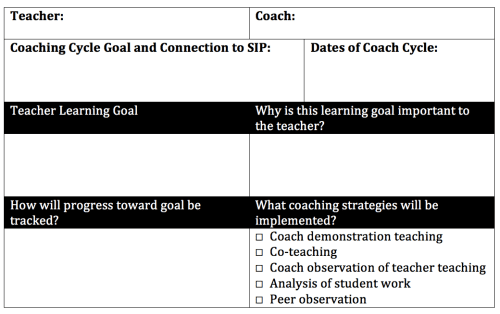By Howard Pitler
Congratulations! Your hard and successful work as a classroom teacher has been rewarded with a new title – INSTRUCTIONAL COACH. In some schools, there isn’t a handbook or set of instructions for instructional coaches. You are just expected to learn and grow on the job. The thinking is, “you were a great teacher so just help others do the great work you did.” This, however, is often a hit-or-miss proposition. After all, does being a great baseball player always translate into being a good baseball coach? What is it specifically that you should be doing as a coach? What protocols should be in your educational toolbox? How will you best engage teachers in reflective practice? What will you do to convince some teachers that they will benefit from a coach? What is being done to insure there is some consistency building to building and coach to coach?
Let’s start out with the fundamental question some teachers will ask, or at least think – why do I need a coach? Am I in trouble? Should I be worried? The truth is that everyone can benefit from a coach. Serena Williams is the #1 female tennis player in the world, yet every day when she is working on her game her coach, Patrick Mouratoglou, is with her.  His role is to examine her practice, ask critical questions, and make suggestions that might make her already champion-level performance just a bit better. The same holds true throughout the sporting world. Football and baseball teams have entire staffs of coaches to help every player be the best they can be.
His role is to examine her practice, ask critical questions, and make suggestions that might make her already champion-level performance just a bit better. The same holds true throughout the sporting world. Football and baseball teams have entire staffs of coaches to help every player be the best they can be.
Teaching has been a profession often practiced in isolation. Talk with the teachers you are to be coaching and share with them that your goal is to help them reflect on and improve their practice. Everyone should have the attitude that they want to be just a bit better today than they were yesterday. Will Rogers said, “Even if you’re on the right track you will get run over if you don’t keep moving.”
Coaching takes trust. An instructional coach has to earn and maintain the trust and confidence of the teachers she is working with. A teacher must feel safe and able to risk mistakes as they grow and move from their current ways of teaching to a new or refined ones. Trying new things sometimes results in failure. Just like with students, redefine FAIL as First Attempt In Learning.
Teaching pedagogy is very personal. Asking someone to change, even slightly, their teaching isn’t much different than telling someone they might look a little better if they just changed their hairstyle. Before I take your advice I need to trust you. Trust is earned over time. Teachers need to have confidence their coach can maintain confidences. A coach is not an evaluator. Teachers aren’t likely to talk about their deficits or concerns about their practice if they think those comments will become part of their evaluation.
To be most effective, coaching should be undertaken as a long-term process. A commonly used duration for a coaching cycle is one grading period. During each coaching cycle, the coach and teacher should begin by agreeing on a specific goal or goals to be accomplished. There should be a clear connection between the agreed-upon goal(s) and the school improvement plan and district strategic plan. Figure 1 is an example of a Teacher/Coach Goal Planning Template used by teacher/coach partners.
Figure 1. Teacher/Coach Goal Planning Template

The initial planning process should identify not only the agree-upon teacher learning goal(s) for the coaching cycle but also how progress toward goal will be monitored. It is suggested that the coach and teacher work together to develop a rubric for the various components of the goal.
In some districts there is no consistency between instructional coaches from one school to the next, leaving all instructional coaches to fend for themselves. Here are a few suggestions for instructional coaches at a building or district level:
-There should be clear objectives tied to outcomes set by the district for all instructional coaches.
-A common set of protocols like the goal planning template above should be provided to and used by all coaches.
-Time should be set aside at least monthly for all instructional coaches to come together and share their plans and strategies. Just as teaching should no longer be done in private, behind a closed door, coaches need to collaborate and grow together.
-As they compare planning tools coaches will likely find a number of similarities that could lead to suggestions for district-wide professional development ideas.
Every teacher needs a good coach – someone believes in them, encourages them, and provides them with valuable and honest feedback. A coach helps the teacher see new perspectives and set their sights on new horizons. Every student needs a great teacher with a good coach’s support.
Check out Pitler’s thoughts on Formative Assessment and whether we actually know what it is.
Howard Pitler, Ed.D. is an international speaker, coach, and facilitator with a passion for improving education for all learners. He was the Executive Director and Chief Program Office for McREL International from 2003 to 2015. Prior to working at McREL, Dr. Pitler spent 29 years in K-12 education as a teacher, assistant principal, elementary school principal, and middle school principal in Wichita, Kansas. Under his leadership, his elementary school was featured as an innovative program by WIRED Magazine, recognized as one of the Top 100 Schools in America by Redbook Magazine, and named an Apple Distinguished Program.




